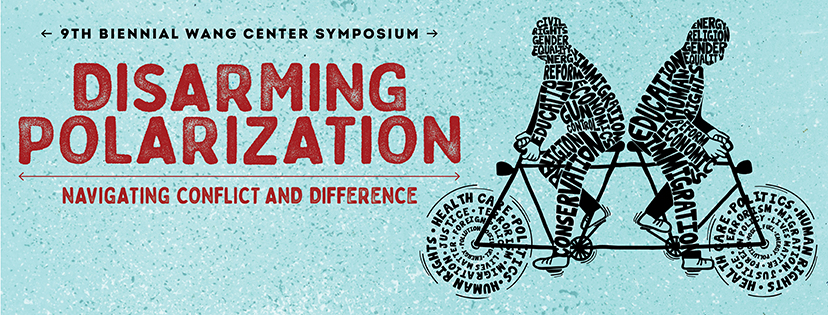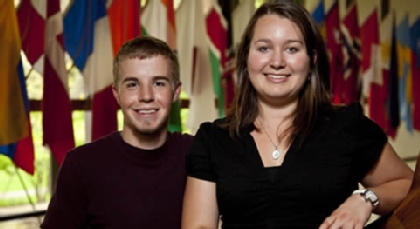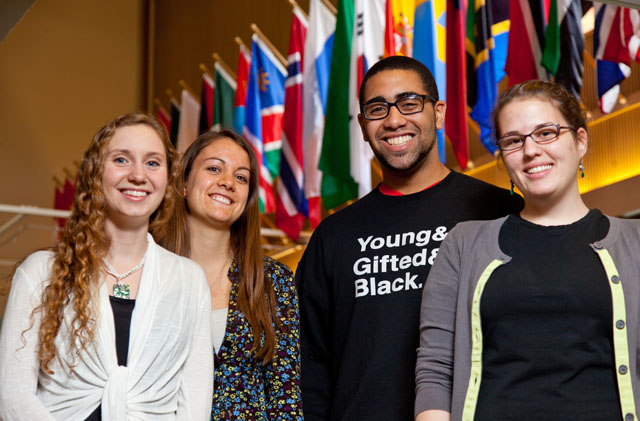Page 77 • (3,216 results in 0.059 seconds)
-
hold political power and the tengabisi (the descendants of the conquered) who are the group ruled by the nyonyosé who historically and today are farmers, blacksmiths, or craftspeople. Traditionally, these two groups who are said to both be powerful and play an active role in daily society have had distinct and separate roles in their relationship with the ancestors. Typically, the tengabisi use and create masks, which represent spirits that they believe have the power to help crops, prevent
-

Disarming Polarization: PLU symposium to address national, global divisiveness Posted by: Marcom Web Team / February 25, 2020 Image: The Wang Center Symposium takes up the issue of heightened political and societal polarization within the U.S. and globally as well as its primary consequence, the increasing inability to communicate and collaborate. February 25, 2020 By Thomas Kyle-MilwardMarketing & CommunicationsTACOMA, WASH. (Feb. 25, 2020) — Noted academics, activists and practitioners whose
-
; departments of Social Work and Political Science; and other disciplinary and interdisciplinary studies Curator: Holly Senn, Librarian Common Reading Book 2021, The Best We Could Do The 2021-2022 academic year Common Reading book is the critically acclaimed graphic novel, The Best We Could Do by Thi Bui. In this timely and breathtaking memoir, Bui explores her experiences as a daughter of Vietnamese immigrants who escaped the fall of Saigon in 1975. Her book describes how she has come to understand her
-

project.” Kelly Ryan – Research in Macedonia Ryan (pictured here on a trip to China) will be working with the Nansen Dialogue Network in Skopje, Macedonia, conducting research in grassroots reconciliation in Macedonia. It’s in connection with his political science capstone project. “I hope to research what makes their reconciliation practices successful and trying to understand how their techniques and findings can impact the rest of the world,” Ryan said. “I am most excited to work with world leaders
-

bring on personal and professional levels through fresh perspectives, learning curves and losing my comfort zone. This opportunity is one that will further challenge me in discovering my vocation and I couldn’t be more excited to begin the adventure.” Mycal Ford ’12 – ETA in Kaosiung Taiwan Ford – from Tukwila, Wash. – doubled majored in Chinese studies and political science. He has accepted an ETA in Kaosiung, Taiwan. As part of his teaching assistantship, Ford will be working on a service project
-

political science and economics. He hopes to attend law school after graduating, then work as a Foreign Service officer in the U.S. State Department — once he’s old enough to do so, at age 30. Ramirez-Ortiz chose PLU because while a smaller school, it’s also globally connected, with opportunities to study abroad and meet people from around the world. “PLU is where you can prepare to become part of the international community,” he says. He plans to take advantage of study-away opportunities, particularly
-
graduates are also suited to earn an M.A. in such fields as anthropology, political science, economics, among others. Sociology degree holders may also be interested in earning a Master of Social Work (M.S.W.), a Master of Public Health (M.P.H.), a Master of Arts in Public Policy (M.P.P.), a Master of Arts in City and Regional Planning (M.C.P.), or a Master of Business Administration (M.B.A.). Ph.D. ProgramsStudents wishing to earn a Ph.D. must enroll in a doctoral program. Sociology doctoral programs
-
International Affairs Program supports graduating seniors or graduates, especially from minorities who are historically underrepresented in the U.S. Foreign Service to do graduate work. Academic disciplines appropriate to this award include: business, economics, foreign languages, international studies, political science, and sociology. Following completion of the M.S. degree, successful candidates are expected to work as a foreign service officer for a minimum of three years. Award/Stipend/Benefits
-
Public Policies and Mentors for First Generation Latino Professionals” 2nd Annual César Chávez & Dolores Huerta Latino Studies Lecture April 6, 2017 Speaker: Dr. María Chávez, Associate Professor of Political Science For this Latinos Studies Lecture, Dr. Chávez shared her latest research on the public policies & mentoring relationships that helped a generation of Latinos to pursue higher education and become professionals. Inspired by Chicana feminist methodologies, Dr. Chávez’s auto-ethnographic
-
. Schnackenberg EndowmentDr. Walter C. Schnackenberg (1917-1973) graduated from Pacific Lutheran College in 1937 and received his B.A. from St. Olaf College in 1939. He received his M.A. from Gonzaga University in 1947 and his Ph.D. from Washington State University in 1950. He taught at PLU from 1942 until 1944, and at Augustana College, Sioux Falls, South Dakota, from 1950 until 1952. He returned to Pacific Lutheran University in 1952 as Associate Professor of History and Political Science, and became
Do you have any feedback for us? If so, feel free to use our Feedback Form.


